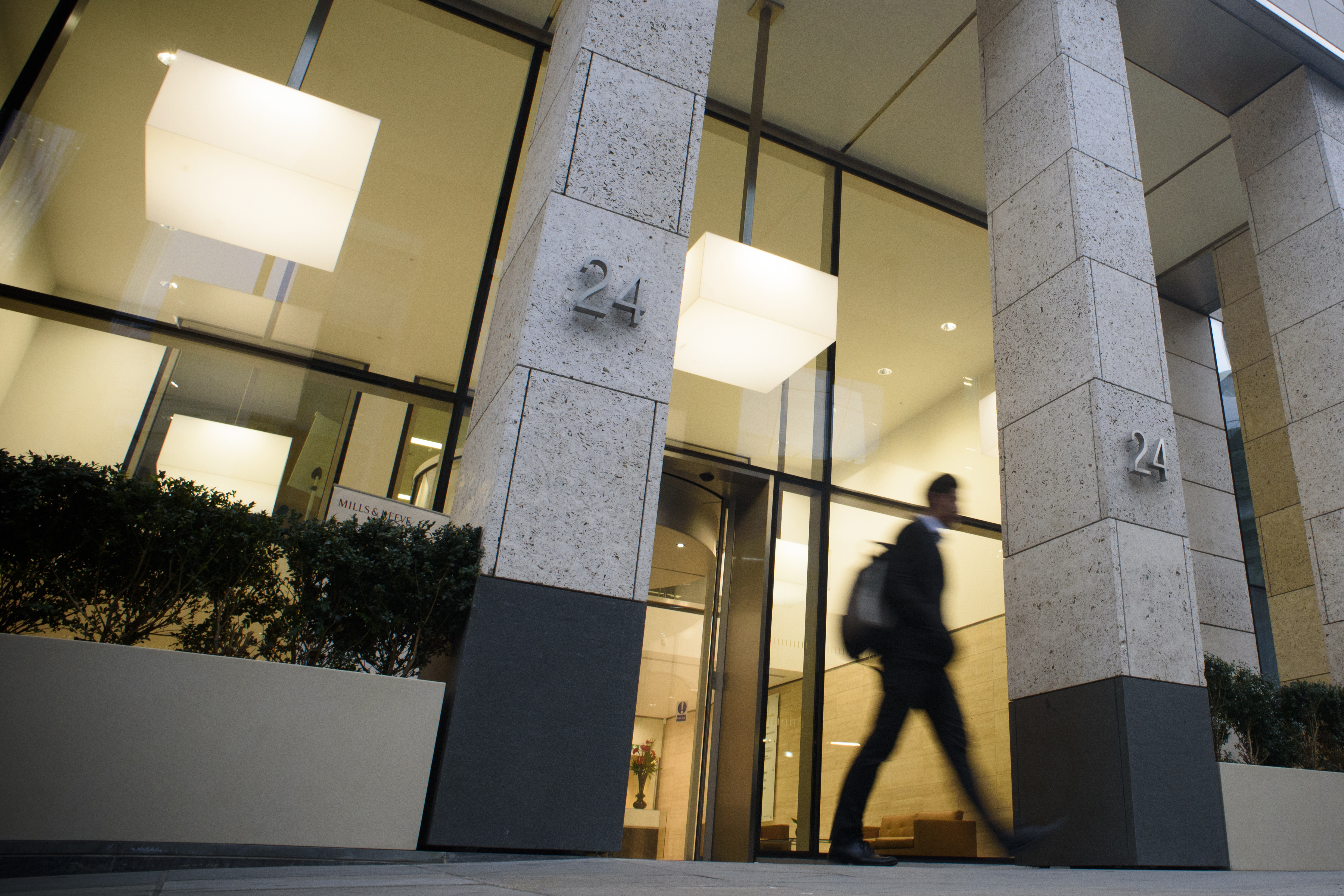The supervision is excellent. As a trainee you are treated equally to fellow fee-earners and receive meaningful and valuable work. I was given exposure to clients very early on in my first seat, alongside a brilliant support system.
The commercial world is changing. Gone are the days when success in business was the purview of a privileged view – nearly always pale and male. Law firms are waking up to the fact that in a diverse, globalised environment, clients want to work with lawyers who understand where they come from and the different ways in which they work. However, altering the way that you recruit and train in order to build this diversity is not always straightforward – unconscious bias is, by its very nature, not something one chooses to apply. Yet Mills & Reeve – winner of this year’s LCN Award for Best Trainer, National/Large Regional firm – have found a devastatingly simple and effective solution to the challenge of how to open your eyes. Close them.
“We started using blind CVs the year before last, in one office, as a trial,” explains Training Principal Caroline Dean, who was appointed to the role 18 months ago and has been at Mills & Reeve for 14 years now. “Then we rolled this out to the whole firm.”

Blind CVs – as the name suggests – means that the candidate’s name and academic background is removed from the application after an initial sift. “It’s a really effective way to strip out our own unconscious bias for Russell Group and Oxbridge universities,” Caroline affirms, maintaining that bold actions such as this are the only way to level a heavily skewed playing field.
We stretch our trainees but we support them – and we never stop doing that.
Recruitment advisor Rachel Chapman explains that Mills & Reeve has backed up this commitment by signing up to RARE, which leads the field in diversity graduate recruitment. “The stats have been very positive so far,” she reports.
“We also offered unconscious bias training to the new recruitment team, which is made up of volunteers throughout the firm,” explains Caroline. When the firm first announced that such training would be provided, the only problem they faced was having too many volunteers – which speaks to the fact that this move towards diversity is no box-ticking exercise but the result of a deep-seated culture throughout Mills & Reeve.
Birmingham-based trainee Amandip Dhillon has certainly benefited from this open-minded approach. Born in Germany, Amandip moved to the United Kingdom when she was six and was part of the first generation in her family to go to university. “Coming from a working-class background means that you don’t necessarily have as many opportunities,” she points out. “But you are still determined to succeed and might have to be more creative with the options you pursue .”
Supervisors are experienced and committed and are keen to ensure that trainees experience all the different types of work within a team.
Her unconventional path to a training contract is an excellent example of this. Amandip studied law at the University of Birmingham and was disappointed to miss out on a place on a vacation scheme in her second year. However, she did not let this setback discourage her. “Instead I did voluntary work experience –two to three days a week at a small high street firm during the long vacation,” she recalls. She then sought out and won a scholarship from her university to cover her costs. “The experience really helped me with applications – it’s so important to add things to your CV.”
This commitment and ingenuity are testament to Amandip’s resilience – a quality valued by Mills & Reeve – and helped her to sail over the next few bumps she encountered. When she did not get a training contract straight out of university, instead of despairing, she pivoted and started to apply for paralegal positions instead. “Six months after finishing I had secured a paralegal position at a high street firm working with private individuals,” she explains with satisfaction. However, this was never the end game for her. She was already aware of the firm and she knew that she wanted to stay in Birmingham, so that meant a regional firm and Mills & Reeve is leader of the pack in the Midlands. Amandip did her research – a friend of a friend who was already working as a paralegal there had only good things to say of the firm, while additional enquiries left her impressed with the calibre of clients and the quality of work on offer. Her mind made up, Amandip used her job as a paralegal as a stepping stone, applying for and obtaining a similar position at Mills & Reeve’s private client department.
And there she might have stayed. Firms need paralegals – it is not always in their interest to help them find routes to qualify as lawyers. However, this was not the case at Mills & Reeve. “The team helped me progress,” explains Amandip. “They never tried to hold on to me as a paralegal. They went out of their way to help with my progression and my application – the partners were more than happy to provide me with references!”
More than ever, we’re looking for people who are open, adaptable and flexible.
Part of the need for firms to look beyond traditional routes to law is not only to attract new talent – but also because graduates have opened their eyes to the fact that there is now more than one track to a legal career. Amandip recalls one woman in her intake who had completed a Waitrose graduate scheme before she decided to switch careers and go for law. “She did her GDL part-time, then her LPC and now she’s doing her training contract. The whole environment is more competitive now,” Amandip muses. “People don’t always apply for training contracts while at University any more – they might consider it as an option later on.”
However, while all these new paths to a training contract are well and good, can such innovative thinking extend into the training contract itself?
“Our managing partner likes to say that we have high wires and strong nets,” Caroline laughs. “We stretch our trainees but we support them – and we never stop doing that.”

Mills & Reeve offers six four-month seats – a move that has proved popular with trainees as it exposes them to more departments than they might otherwise experience in the two-year training contract. “I’m still not sure where I want to qualify,” laughs Amandip. “So it’s really good to have extra options. So far I’ve done corporate, construction and real estate in Manchester – it was a really positive experience to work in a different office.”
Given the pace of change between seats, excellent support is critical. “The key is to make sure that there is a rapport between each trainee and their seat supervisor,” Caroline explains. “We make sure we have the right people in place and that they know what’s expected of them. Supervisors are experienced and committed and are keen to ensure that trainees experience all the different types of work within a team. Obviously reviews are an important part of this but it’s also about the day-to-day interaction. This generation needs constant feedback – it’s how they were taught at school. When they do a piece of work they expect feedback there and then.”
Trainees are also allocated a principal, who remains with them throughout the two-year duration of the training contract. “This is a partner,” reports Rachel. “Someone who is very well integrated who can act as a champion for them and also as a mentor. We also match them with a ‘buddy’ from the year above – someone they can go to with the smaller, day-to-day issues – the kind of thing you don’t always want to bring to a partner.”
I’ve worked on some high-value transactions and I’ve felt really involved. It’s never mundane here.
This level of support is crucial over the intense two years of the training contract. Amandip admits that she has found that being a trainee is very different to being a paralegal. “When you’re a paralegal, you’re a fee earner in your own right and you’re managing your own files,” she points out. This situation could not be more different as a trainee. The six-seat training contract inevitably means that trainees often come in half-way through matters. “In the corporate department I was the fourth trainee to work on a particular deal,” Amandip recalls. “It was complex and stressful but it was a really good day when it completed – the clients were really happy. The responsibility feels the right level for a trainee. I’m in contact with clients and I’m trusted to complete matters without someone looking over my shoulder. I’ve worked on some high-value transactions and I’ve felt really involved. It’s never mundane here.”
The support does not stop here but extends to deeper, structural issues as well. “It’s crucial to have the right facilities,” Caroline confirms. Mills & Reeve has been refurbishing all its offices and she explains that they encountered various issues in Norwich when the people there were relocated to a nearby building while improvements were underway. “The temporary space was a very traditional set up and we just had nowhere to go!” she says. “It was really awkward.” In sharp contrasts to this, the refurbished Mills & Reeve offices have placed a high priority on creating more breakout spaces, which in turn allow for informal, spontaneous one-to-ones. “Trainees use those a lot,” adds Rachel. “It’s about taking people away from their computer so that they can meet.”
As well as the less usual six-seat system, the Mills & Reeve training contract also distinguishes itself by offering a significant number of client secondments –a practice from which Amandip has already benefited when she worked as a paralegal. Rachel explains that this is an excellent way for trainees to appreciate the firm’s over-riding focus on client care and to gain experience of working in-house.

So where next for Mills & Reeve? “More than ever, we’re looking for people who are open, adaptable and flexible,” Caroline reflects. “The law is changing – technology and artificial intelligence are going to have a big impact on the way that we do business, so we need people who will be open to that. We’re looking for people with potential, which can take us through to the next stage.”
“Drive is another one,” says Rachel, when considering what qualities the firm is looking for in potential trainees. “We’re looking for the future leaders of the firm – and that doesn’t always mean partners.”
“Commerciality is key for the firm,” Caroline points out. “ We have a very broad church of practice areas – from corporate to family practice; we’re looking for people to advise clients in a wider way, to become their trusted advisers.”
The pace of change shows no signs of slackening. The recruitment and training departments are already at the forefront of new paths to qualification. “We’re spending a lot of time trying to work out our approach to the new Solicitors Qualifying Exam which came out of the Legal Education and Training Review,” Caroline confirms. “And we already have several apprentices. I’d like to see them go all the way through and meet up with the training contract cohort during the two years. It’ll be tricky but if we can make it work it will be worthwhile.” Given the way that Mills & Reeve has already embraced change and acted decisively to transform the way that it recruits, it’s fair to say that they’re looking ahead with eyes open.
By Liz Rutherford-Johnson

Best Trainer – National/Large Regional Firm
The supervision is excellent. As a trainee you are treated equally to fellow fee-earners and receive meaningful and valuable work. I was given exposure to clients very early on in my first seat, alongside a brilliant support system.

